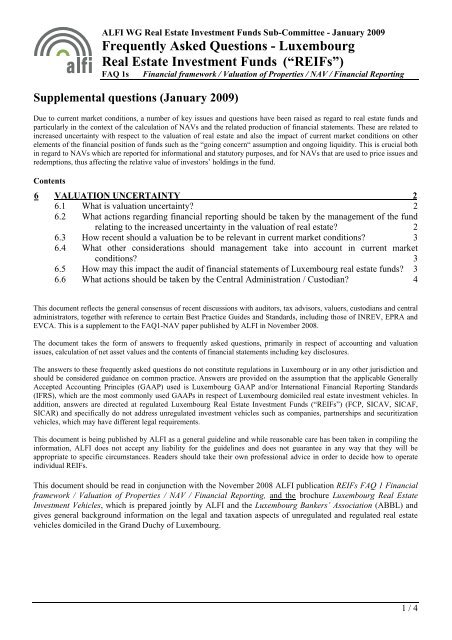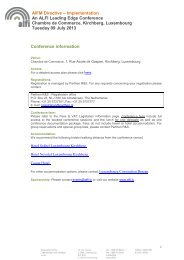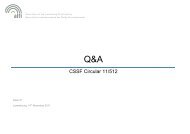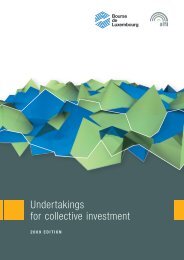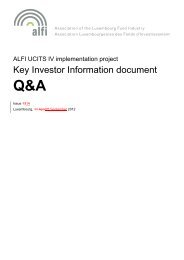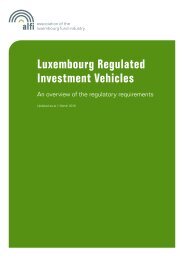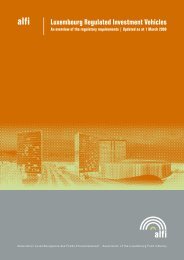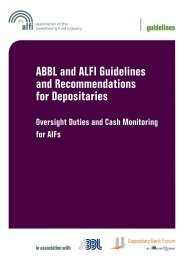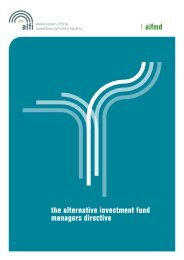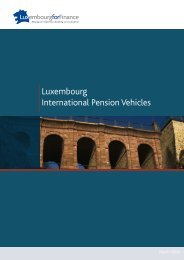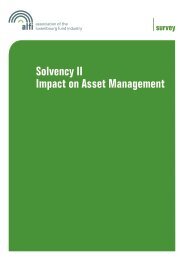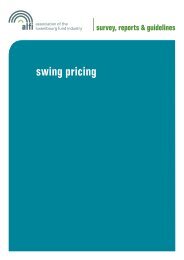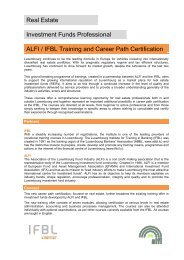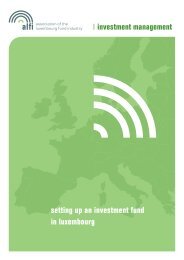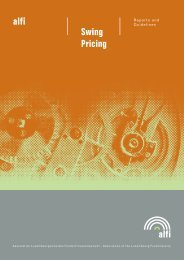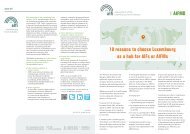Real Estate fund matters - Alfi
Real Estate fund matters - Alfi
Real Estate fund matters - Alfi
Create successful ePaper yourself
Turn your PDF publications into a flip-book with our unique Google optimized e-Paper software.
U6U UVALUATION<br />
ALFI WG <strong>Real</strong> <strong>Estate</strong> Investment Funds Sub-Committee - January 2009<br />
Frequently Asked Questions - Luxembourg<br />
<strong>Real</strong> <strong>Estate</strong> Investment Funds (“REIFs”)<br />
FAQ 1s Financial framework / Valuation of Properties / NAV / Financial Reporting<br />
Supplemental questions (January 2009)<br />
Due to current market conditions, a number of key issues and questions have been raised as regard to real estate <strong>fund</strong>s and<br />
particularly in the context of the calculation of NAVs and the related production of financial statements. These are related to<br />
increased uncertainty with respect to the valuation of real estate and also the impact of current market conditions on other<br />
elements of the financial position of <strong>fund</strong>s such as the “going concern“ assumption and ongoing liquidity. This is crucial both<br />
in regard to NAVs which are reported for informational and statutory purposes, and for NAVs that are used to price issues and<br />
redemptions, thus affecting the relative value of investors’ holdings in the <strong>fund</strong>.<br />
Contents<br />
UNCERTAINTY 2U<br />
U6.1U UWhat is valuation uncertainty?U 2<br />
U6.2U<br />
UWhat actions regarding financial reporting should be taken by the management of the <strong>fund</strong><br />
relating to the increased uncertainty in the valuation of real estate?U 2<br />
U6.3U UHow recent should a valuation be to be relevant in current market conditions?U 3<br />
U6.4U<br />
UWhat other considerations should management take into account in current market<br />
conditions?U<br />
3<br />
U6.5U<br />
UHow may this impact the audit of financial statements of Luxembourg real estate <strong>fund</strong>s?U 3<br />
U6.6U<br />
UWhat actions should be taken by the Central Administration / Custodian?U<br />
4<br />
This document reflects the general consensus of recent discussions with auditors, tax advisors, valuers, custodians and central<br />
administrators, together with reference to certain Best Practice Guides and Standards, including those of INREV, EPRA and<br />
EVCA. This is a supplement to the FAQ1-NAV paper published by ALFI in November 2008.<br />
The document takes the form of answers to frequently asked questions, primarily in respect of accounting and valuation<br />
issues, calculation of net asset values and the contents of financial statements including key disclosures.<br />
The answers to these frequently asked questions do not constitute regulations in Luxembourg or in any other jurisdiction and<br />
should be considered guidance on common practice. Answers are provided on the assumption that the applicable Generally<br />
Accepted Accounting Principles (GAAP) used is Luxembourg GAAP and/or International Financial Reporting Standards<br />
(IFRS), which are the most commonly used GAAPs in respect of Luxembourg domiciled real estate investment vehicles. In<br />
addition, answers are directed at regulated Luxembourg <strong>Real</strong> <strong>Estate</strong> Investment Funds (“REIFs”) (FCP, SICAV, SICAF,<br />
SICAR) and specifically do not address unregulated investment vehicles such as companies, partnerships and securitization<br />
vehicles, which may have different legal requirements.<br />
This document is being published by ALFI as a general guideline and while reasonable care has been taken in compiling the<br />
information, ALFI does not accept any liability for the guidelines and does not guarantee in any way that they will be<br />
appropriate to specific circumstances. Readers should take their own professional advice in order to decide how to operate<br />
individual REIFs.<br />
This document should be read in conjunction with the November 2008 ALFI publication REIFs FAQ 1 Financial<br />
framework / Valuation of Properties / NAV / Financial Reporting, Uand theU brochure Luxembourg <strong>Real</strong> <strong>Estate</strong><br />
Investment Vehicles, which is prepared jointly by ALFI and the Luxembourg Bankers’ Association (ABBL) and<br />
gives general background information on the legal and taxation aspects of unregulated and regulated real estate<br />
vehicles domiciled in the Grand Duchy of Luxembourg.<br />
1 / 4
ALFI WG <strong>Real</strong> <strong>Estate</strong> Investment Funds Sub-Committee - January 2009<br />
Frequently Asked Questions - Luxembourg<br />
<strong>Real</strong> <strong>Estate</strong> Investment Funds (“REIFs”)<br />
FAQ 1s Financial framework / Valuation of Properties / NAV / Financial Reporting<br />
6 0BUVALUATION UNCERTAINTY<br />
6.1 1BUWhat is valuation uncertainty?<br />
6.1.1 7BRecent financial and property market conditions, including the “credit crunch”, have reduced property<br />
transaction volumes significantly, in all global property markets. This market instability has increased<br />
uncertainty around any reported investment property fair value.<br />
6.1.2 8BPractically all regulated real estate <strong>fund</strong>s in Luxembourg rely on independent valuation reports to determine the<br />
reported fair value of their investment property portfolio at their year-end and interim reporting dates.<br />
6.1.3 9BThe vast majority of Luxembourg <strong>Real</strong> <strong>Estate</strong> Investment Funds (“REIFs”) commission valuations according to<br />
the International Valuation Standards Council (“IVSC”) Best Practice guidelines and/or the Royal Institution of<br />
Chartered Surveyors (“RICS”) Appraisal and Valuation Standards (“the Red Book”).<br />
6.1.4 10BMaterial valuation uncertainty may arise from a variety of factors associated with a particular property,<br />
including but not limited to location, unusual characteristics, lack of current information available about the<br />
1<br />
property, development status, ongoing legal issues and market instability. Under RICS guidanceF F, valuation<br />
uncertainty paragraphs, if included, should not cause the management of the <strong>fund</strong> or its auditor to question the<br />
validity of the valuation, and should not amount to standard caveats or general disclaimers.<br />
6.1.5 11BDespite the RICS guidance, it is conceivable that valuation reports may contain emphasis of matter paragraphs<br />
making reference to specific circumstances relating to individual properties. It is also possible that valuation<br />
reports contain a qualification of the valuation or only provide a range of possible values.<br />
6.1.6 12BDue to significant uncertainties as described above, particularly market instability, valuers have recently and are<br />
indicating that they may continue to include ‘valuation uncertainty’ paragraphs in some valuation reports. Most<br />
of the uncertainty paragraphs seen to date do not caveat the valuation opinion provided. However, they do<br />
typically draw the reader’s attention to the financial backdrop against which the valuations have been assessed.<br />
6.2 2BUWhat actions regarding financial reporting should be taken by the management of the <strong>fund</strong><br />
relating to the increased uncertainty in the valuation of real estate?<br />
6.2.1 13BManagement should review all the valuation reports received from independent valuers in order to understand<br />
the methods and assumptions used by the independent valuers to estimate fair value of the properties. This<br />
review should include an assessment whether the valuation reports contain only standard uncertainty paragraphs<br />
or whether the valuer has put a caveat on their valuations in any way. In addition management should check<br />
whether the conclusions reached by the independent valuer are not materially inconsistent with its own<br />
assessment and understanding of a particular market and with comparator market transactions.<br />
6.2.2 14BIn<br />
order to appropriately draw the reader’s attention to increased uncertainty cited in the valuers’ report (if any<br />
is stated), management should consider enhancing disclosures in the financial statements in the following areas:<br />
• the investment property note, which typically already includes disclosures on the valuers used by the<br />
company, which could be extended to describe special assumptions used in the valuation reports and any<br />
other relevant information highlighting the increased uncertainty of the real estate valuation as stipulated;<br />
• the accounting policy ‘valuation method’ note, if the valuation method used by the client or valuer has<br />
changed;<br />
• the critical accounting estimates and judgments disclosures, to highlight increased uncertainty surrounding<br />
real estate fair value estimates;<br />
• the disclosures around market risk and the impact on financial instruments that rely on covenant<br />
compliance.<br />
6.2.3 15BThese additional disclosures could include reference to some or all of the following topics depending on the<br />
particular situation:<br />
1 See RICS Red Book Guidance Note 5, and the ‘Valuation Uncertainty and Market Instability’ bulletin issued by RICS on 26<br />
November 2008. (http://www.rics.org/Practiceareas/Property/Valuation/val_uncertainty_f_271108.html)<br />
2 / 4
ALFI WG <strong>Real</strong> <strong>Estate</strong> Investment Funds Sub-Committee - January 2009<br />
Frequently Asked Questions - Luxembourg<br />
<strong>Real</strong> <strong>Estate</strong> Investment Funds (“REIFs”)<br />
FAQ 1s Financial framework / Valuation of Properties / NAV / Financial Reporting<br />
• a sensitivity analysis on property yields or an indication of the range of potential valuation outcomes to the<br />
extent that the valuer is willing to provide this information within their valuation reports; and<br />
• a reproduction of the additional ‘valuation uncertainty’ wording included in the valuation report by the<br />
valuers if the report is not reproduced within the financial statements, or a suitable cross reference if it is.<br />
6.3 3BUHow recent should a valuation be to be relevant in current market conditions?<br />
6.3.1 16BLuxembourg REIF regulations indicate that a minimum frequency of annual property valuations is acceptable.<br />
Many REIFs have previously organized themselves on an annual valuation cycle, which has meant that real<br />
estate valuations that were used for financial reporting purposes were often commissioned several months or<br />
quarters before the reporting date. Due to the current volatility in the real estate market and the potential for<br />
significant change in values over time, excessively aged independent valuations do not seem any longer to be a<br />
prudent basis for financial reporting.<br />
6.3.2 17BIndependent valuation reports should be updated on a regular basis for reporting purposes. It is desirable to have<br />
independent valuations performed on the reporting date, e.g. 31 December 2008, or close to this date. What is to<br />
be considered close enough to a reporting date will depend on individual circumstances and a decision needs to<br />
be taken on a case by case basis. Where formal valuation reports have been issued at a significantly earlier date,<br />
management should consider requesting updates from the independent valuers.<br />
6.4 4BUWhat other considerations should management take into account in current market conditions?<br />
6.4.1 18BA<br />
key example of this scenario is to consider the impact on the ‘going concern’ assumption. Management may<br />
find themselves in a position where the going concern basis is clearly threatened by a property valuation<br />
outcome that is within the potential variability of the valuation figure. This would typically arise through lower<br />
valuation levels breaching loan-to-value covenants within a Group’s loan portfolio and therefore triggering<br />
repayments of the loan or at least additional cash deposit requirements with the relevant banks. Where this is the<br />
case, it is appropriate to conclude that the consequence of the valuation uncertainty on the presentation of the<br />
financial statements is significant, and therefore an emphasis of matter is required as a minimum in the audit<br />
report, and possibly consideration of adopting the break-up basis in extreme circumstances.<br />
6.4.2 19BManagement should review its <strong>fund</strong>ing in order to ensure that enough liquidity is available to the <strong>fund</strong> to<br />
continue as a going concern. Special attention should be paid to maturing credit facilities and lines of credit<br />
available from banks which themselves may have liquidity issues. Given the current economic climate<br />
management should also consider whether committed but uncalled capital is still available to the <strong>fund</strong> to<br />
overcome liquidity issues.<br />
6.4.3 20BA<br />
review of any commitments or contingent liabilities the <strong>fund</strong> might have, e.g. from sales of properties in prior<br />
years, which might trigger cash payments due to the current downturn in the economy, should be carried out.<br />
6.4.4 21BAny issued identified from the above should be considered in the preparation of the reporting of the <strong>fund</strong>.<br />
6.5 5BUHow may this impact the audit of financial statements of Luxembourg real estate <strong>fund</strong>s?<br />
6.5.1 22BIn<br />
general, auditors will have to perform more work with respect to the uncertain elements of the valuation as<br />
described above such as the valuation of properties and the going concern assumption. Auditors will have to<br />
review and assess the appropriateness of the assumptions made by management and the reliability of the<br />
supporting documentation gathered to support their conclusions.<br />
6.5.2 23BAuditors may also consider modifications to their audit report in certain circumstances, including where in their<br />
judgement:<br />
• Assumptions and judgments made by management in valuing the properties are inaccurate or<br />
inappropriate;<br />
• Insufficient evidence exists, or has been considered, to reasonably value the properties;<br />
• Disclosures with respect to the uncertainty of the valuation of underlying <strong>fund</strong>s are inadequate;<br />
• The valuer has qualified the valuation of the properties<br />
3 / 4
ALFI WG <strong>Real</strong> <strong>Estate</strong> Investment Funds Sub-Committee - January 2009<br />
Frequently Asked Questions - Luxembourg<br />
<strong>Real</strong> <strong>Estate</strong> Investment Funds (“REIFs”)<br />
FAQ 1s Financial framework / Valuation of Properties / NAV / Financial Reporting<br />
• Disclosures with respect to covenant breaches are inadequate<br />
• There is doubt as to the ‘going concern’ basis of the <strong>fund</strong>;<br />
• Disclosures with respect to the ‘going concern’ basis of the <strong>fund</strong> are inadequate.<br />
• Assumptions and judgments made by management in respect of the ‘going concern’ basis of the <strong>fund</strong> are<br />
inaccurate or inappropriate.<br />
6.6 6BUWhat actions should be taken by the Central Administration / Custodian?<br />
6.6.1 24BCentral Administrators should work closely with the <strong>fund</strong> manager and <strong>fund</strong>’s Board to assess:<br />
• What values should be included in the accounts for the NAV calculation, if the independent valuation<br />
report includes a valuation uncertainty paragraph or a caveat to the valuation. The ultimate responsibility<br />
lies at Board level, who can ultimately decide whether or not to include impairment in the accounts.<br />
• What additional disclosures (if any) in the notes to the accounts of the financial statements are required.<br />
6.6.2 25BNo<br />
special actions need to be made by Custodians in relation with the above. The provisions of Chapter E of<br />
IML Circular 91/75 (the “Circular”) are still applicable and provide for the regulatory framework regarding all<br />
Luxembourg <strong>fund</strong>s irrespective of their legal form or regime. According to the Circular, the custodian “has to<br />
have knowledge at any time on how the assets of the <strong>fund</strong> have been invested and where and how these assets<br />
are available”. The custody obligation has to be understood in the sense of supervision rather than safekeeping.<br />
4 / 4


